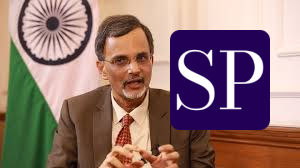The Government of India has extended the tenure of Chief Economic Adviser (CEA) V. Anantha Nageswaran for an additional two years, ensuring his service until March 31, 2027. The decision was approved by the Appointments Committee of the Cabinet (ACC), which is chaired by Prime Minister Narendra Modi. According to an official order, Mr. Nageswaran’s tenure has been extended on a contract basis until the mentioned date or until further notice.
Continuity in Economic Advisory Leadership
Mr. Nageswaran initially assumed office as Chief Economic Adviser on January 28, 2022, for a three-year term. His extension comes at a crucial time when India’s economic landscape is being closely monitored amid global uncertainties and domestic economic shifts.
The CEA’s role is pivotal in formulating economic policies, providing recommendations to the government, and drafting the Economic Survey, which is presented in Parliament before the Union Budget. His continued tenure ensures policy continuity, especially at a time when India’s economy faces both growth prospects and structural challenges.
Economic Growth Outlook and Policy Implications
The extension of Mr. Nageswaran’s term follows the release of the Economic Survey 2024-25, which projected India’s GDP growth for the next financial year at 6.3-6.8%. This projection underscores a measured optimism regarding economic expansion despite global uncertainties and domestic economic moderation. The government’s advance estimates suggest the Indian economy is likely to grow at 6.4% in the current financial year.
With his expertise in macroeconomic policy and financial markets, Mr. Nageswaran is expected to continue playing a crucial role in shaping economic policies that bolster investment, employment, and fiscal management. His insights will be significant in guiding India’s economic trajectory as it navigates global inflationary pressures, trade realignments, and evolving financial regulations.
Academic and Professional Background
Before taking up the CEA role, Mr. Nageswaran had an illustrious career spanning academia, research, and financial markets. He has previously worked with Credit Suisse Group AG and Julius Baer Group and has been actively involved in policy advisory roles. Between 2019 and 2021, he served as a part-time member of the Economic Advisory Council to the Prime Minister.
Apart from his corporate experience, he has contributed significantly to academia, teaching at prestigious business schools and institutes of management in India and Singapore. He holds an MBA from the Indian Institute of Management, Ahmedabad, and earned a PhD in Finance from the University of Massachusetts in 1994, specializing in the empirical behavior of exchange rates.
Contributions to Economic Research and Policy Initiatives
Mr. Nageswaran has been instrumental in shaping research-driven policy initiatives. He co-founded the Takshashila Institution, an independent research center focusing on public policy. Additionally, he played a key role in launching India’s first impact investment fund with the Aavishkaar Group in 2001, aimed at fostering social entrepreneurship and sustainable development.
His leadership at the IFMR Graduate School of Business as Dean and his role as a Distinguished Visiting Professor of Economics at Krea University further highlight his academic contributions to economic policymaking.
Challenges and Opportunities Ahead
As CEA, Mr. Nageswaran is expected to address several economic challenges, including managing inflation, enhancing fiscal discipline, promoting digital and green economy initiatives, and strengthening India’s financial markets. His tenure extension aligns with the government’s commitment to ensuring stability in economic policymaking at a time when India is positioning itself as a global economic powerhouse.
With significant economic policy measures anticipated in the coming years, Mr. Nageswaran’s extended tenure will allow him to oversee critical economic reforms, structural adjustments, and fiscal strategies aimed at sustaining India’s growth momentum.
The decision to extend his tenure underscores the government’s confidence in his ability to navigate complex economic landscapes and provide strategic guidance that aligns with India’s long-term economic vision.
